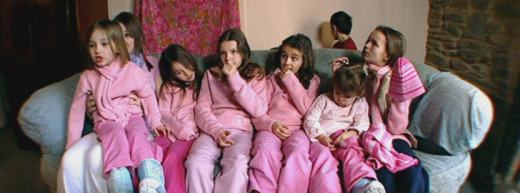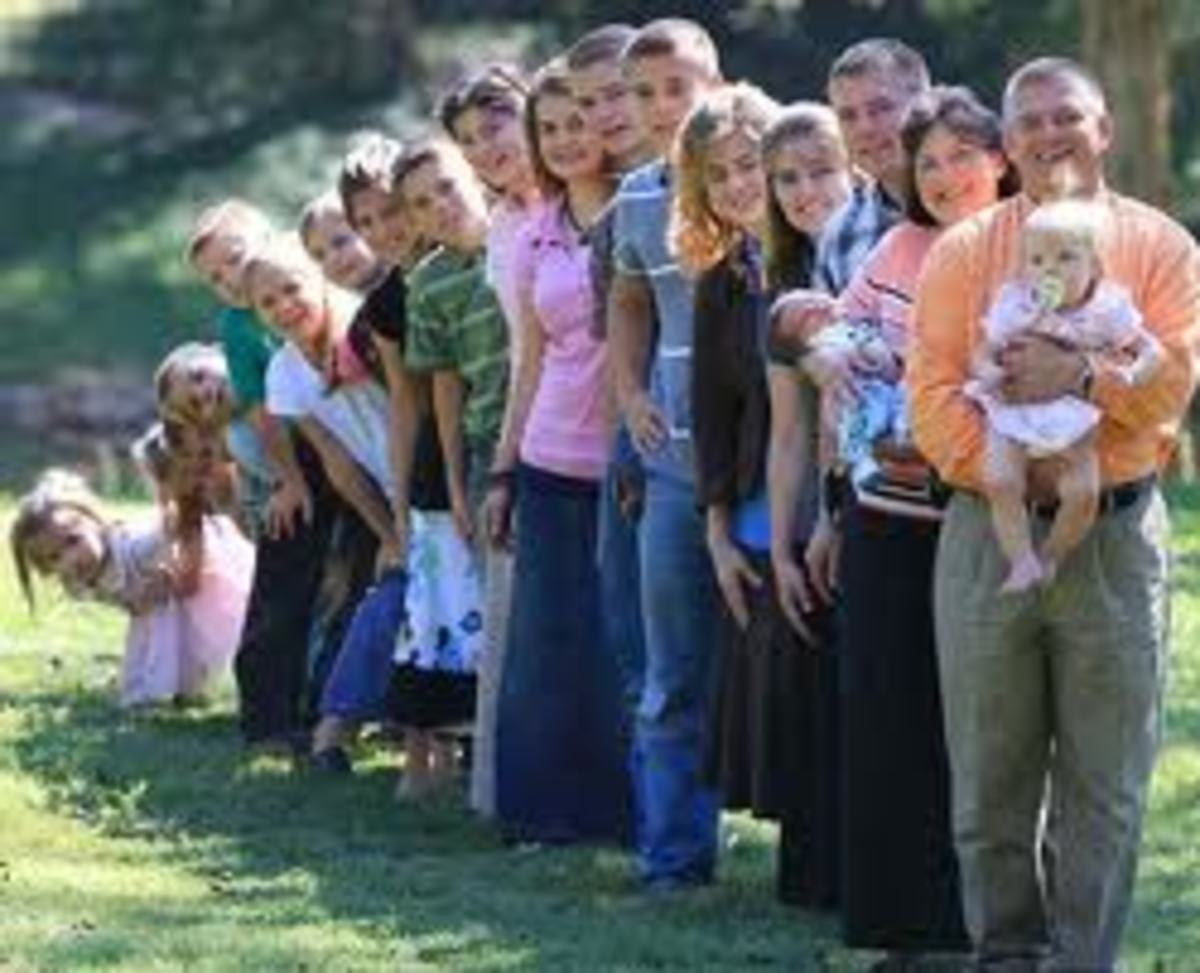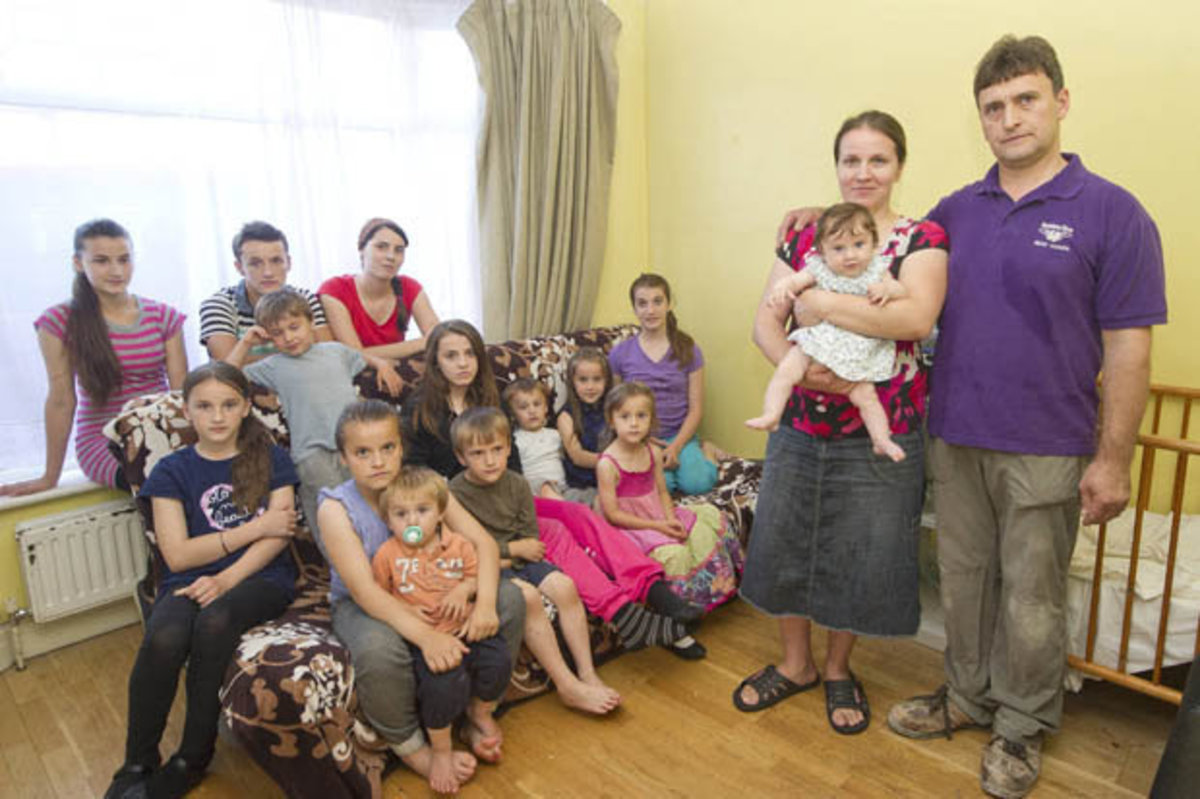The Heretofore of the Large Family System, Part 3/3

The WHYs, HOWs, And WHATs Of The Large Family System
The concluding part of this hub is in response to the request WHAT ARE SOME OF THE ADVANTAGES AND DISADVANTAGES OF HAVING A LARGE FAMILY by esteemed hubber cardisa.
Children in large families often are afraid to express themselves and voice their individual needs because they were raised with the premise that this was selfish. They are extremely loathe to express their individuality. As a result of this, many refuse to acknowledge their particular needs, expecting their needs, expecting others to innately know and/or take care of their individuals needs and wants. When the latter cannot and/or will not take care of the former's individual needs and wants, the former often adopt a poor me attitude, wanting to be rescued.
Some become extremely passive, letting others either take them for granted or take advantage of them. A few resort to manipulative guilt trips and mindgames in order to get others to met their individual needs and to do things their way. Still others masochistically deny all aspects of their selfhood, always being the giver/helper. Many are afraid and cannot say no to the needs of others and cannot establish clear boundaries for themselves, being perpertual doormats.
Children in large families because they were raised to deny and/or sublimate their selfhood and individuality deem people who are self-assertive and ask for what they want as selfish. They are also intolerant of people who put themselves first as they were raised to always put themselves and their needs last. People who are highly individualistic and have a high self-regard are deemed as spoiled to them.
Children in large families have no sense of privacy and space. They often have to share their territory and space. They are used to living publicly. Everyone knows what everyone is doing, thinking, and/or being so to speak. There is no concept of privacy, solitude, and peace in the large family system. Everything and everyone is exposed in the large family.
Children in large families feel that privacy is useless. What? Privacy? They feel that it is such a quaint concept. They are used in living in a crowd where exposure is the name of the game. Because they are comfortable being in crowds, many are are uncomfortable with solitude. The concept is quite anomalous to them. They also feel that privacy is so unnecessary among family members.
Children from large families believe that the concept of solitude is quite weird. They wonder why would anyone in their "normal" state would want to be alone. According to them, people who want solitude are in need of some serious psychological help. The idea that one wants to be alone and/or to have his/her own room is quite maddening to say the least. Being alone is equated to being somewhat amiss to many children in large families.
Children from large families tend to be insular because they do not have the need to cultivate outside friends and/or associates. In fact, they have very few or no friends. They already have an inhouse social network in their siblings. In addition to making them very insular, they also have a more parochial outlook because their primary source of friends are their siblings who have the same or similar viewpoints.
Because their primary friendships are with siblings, many children in large families are quite uncomfortable with making outside friendships. Their siblings are their proverbial security blanket. Many of them are quite suspicious of non-related children and/or other related children who are not their siblings.
Children from large families do not see the importance of outside, non-related friendships and associations. They view such things as a moot point regarding relationships. According to them, the only valid relationships are with their siblings and no one else. They do not understand why people would want outside friendships and associations.
Many children from large families oftentimes cannot relate to those who are not their siblings. They often place their siblings before even their own spouses and children much to the disdain of both. They feel that their spouses and children will never be as important as their siblings.
Because monies are tight in the large family, there is only money allocated for the bare rudiments, if that. There is certainly very little or no extra monies for educational, cultural, and/or other intellectual activities. Intellectual and academic attainment are not emphasized in the large family environment. Bare survival is what is the most important issue of the day.
Many children in large families learn to create their own activities as a result of monies not being available for them to participate in outside intellectual, cultural, and/or academic activities. Since books and/or other intellectual paraphenalia are not in their homes, it is often difficult for them to keep pace academically. Also, many large families do not have computers in their homes which make their children even more disadvantaged in the postmodern world where computer are a necessity. In order for them to have access to computers, they often must go to libraries.
Another afterthought of having very few financial resources, children in large families are the least likely to pursue tertiary education. Many are lucky if they complete secondary levels of education. Many children in large families are taken out of school by their parents and have to work to supplement their family's income. The priority of large families is not the education of their children but socioeconomic survival.
Because many children in large families cannot attend college and/or higher forms of education, they are often relegated to menial, dead end jobs with no promotional opportunities. Their limited education and job prospects have an adverse effect on their earning power. They are usually the poorest socioeconomically throughout their lives.
VI. THE SUMMARIZATION/CONCLUSIVE ANALYSIS
The large family was extremely advantageous in rural, preurbanized, and agrarian times before the late 19th and early 20th centuries where there were few social network systems outside of the family. The large family provided financial, social, and emotional support. Having lots of children per household was necessary in an agrarian economy in that more hands were needed to work and farm the land.
Furthermore, having lots of children provided parents and older relatives with human insurance in their old ages. Large families also provided a support system for single relatives. Single women were often supported by large families in a time when it was quite onerously difficult for them to find a respectable livelihood.
However, with the increasing urbanization in the very late 19th and early 20th centuries, the large family started to become a problematic issue. In urban areas, space was at a premium and children did not contribute to the family as much, more children presented more financial liabilities. Many poor parents in urban areas become increasingly stressed, worrying as to how they could support their ever growing families. Many became so overwhelmed regarding this issue that some parents deserted and abandoned their children.
Because of increasing stress raising such a large numbers of children, there were greater instances of domestic and/or child abuse as the situation was too much to bear. So many children either were runaways and/or throwaways because their parents no longer wanted them. These children were left to their own devices, often gravitatiing towards crime and/or other nefarious activities in order to make a living.
Many people believe that the implementation of effective birth control would raise the quality of family life and decrease the delinquency of children in urban areas. Margaret Sanger, a nurse, educated women on the importance of birth control, family planning, and being in control of her reproductive destiny. As a result of the implementation of birth control methods, families started to become smaller.
As opportunities for women broadened and become available such as greater access to education, more advanced contraception, and more job avenues, large families plummeted. In addition to that, there were concerns about the affect of overpopulation on the earth's natural resources. In the 1970s and beyond, small families were the norm as people became increasingly educated, they were cognizant of the benefits of the small family system and the myriad opportunities it afforded one.
Simultaneously, people began seeing the multiple disadadvantages of the large family system. The values of the large family are often inverse with children being parents to themselves and/or each other, often working to buy the things they need and/or to supplement the family income, believing that a child who receives individualized parental attention to be spoiled, and/or the art of doing without and/or with very little is viewed as an acceptable and normal lifestyle.
The large family was fine where there were few social networks. However, as societies became more modern and urbanized with an increasing social network, large families started to become an anathema. In this postmodern, postindustrialized society with a wide globalized social network, there is no longer a need for large families. Hopefully, the large family is going through its death throes, eventually becoming a relic of an earlier era!








